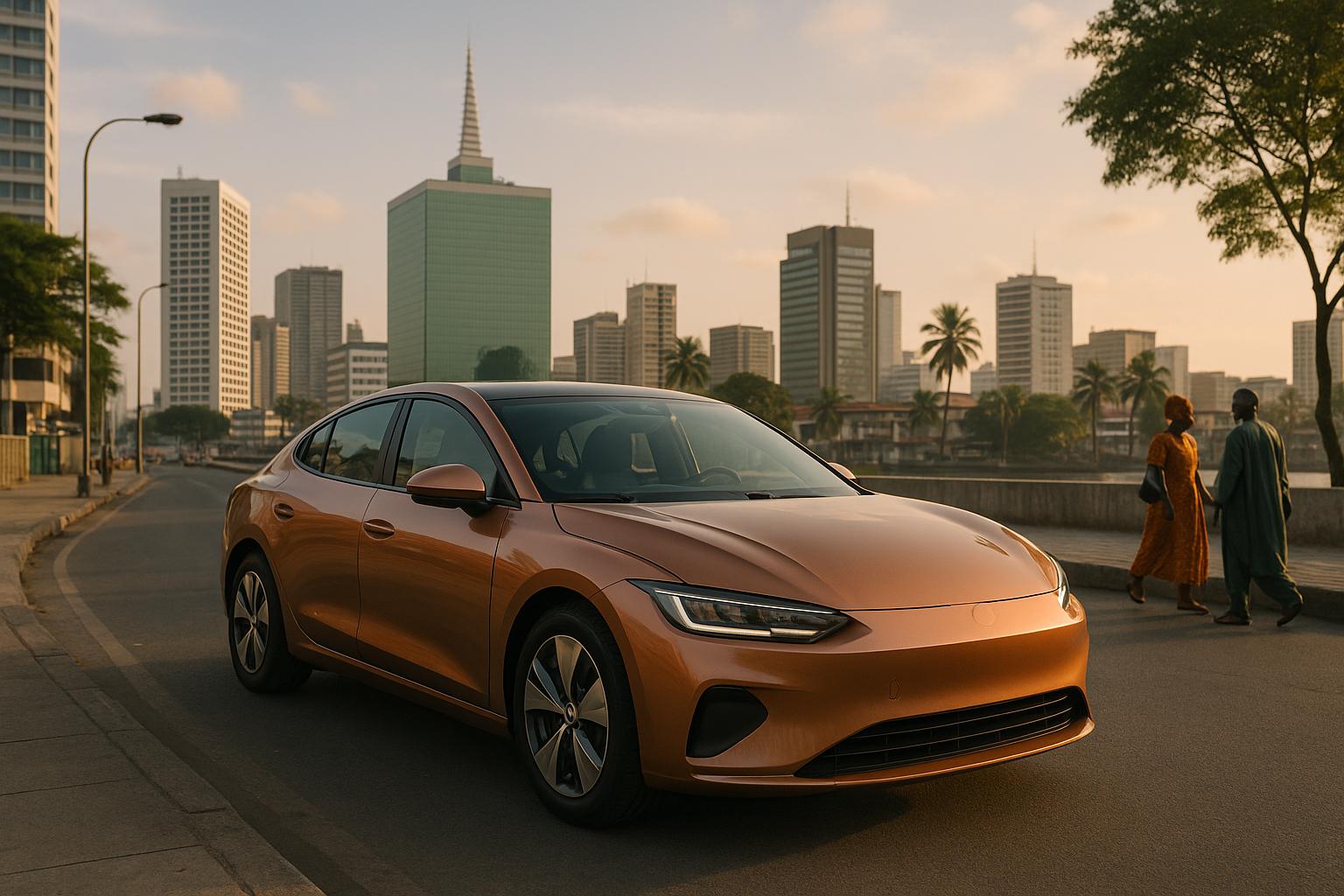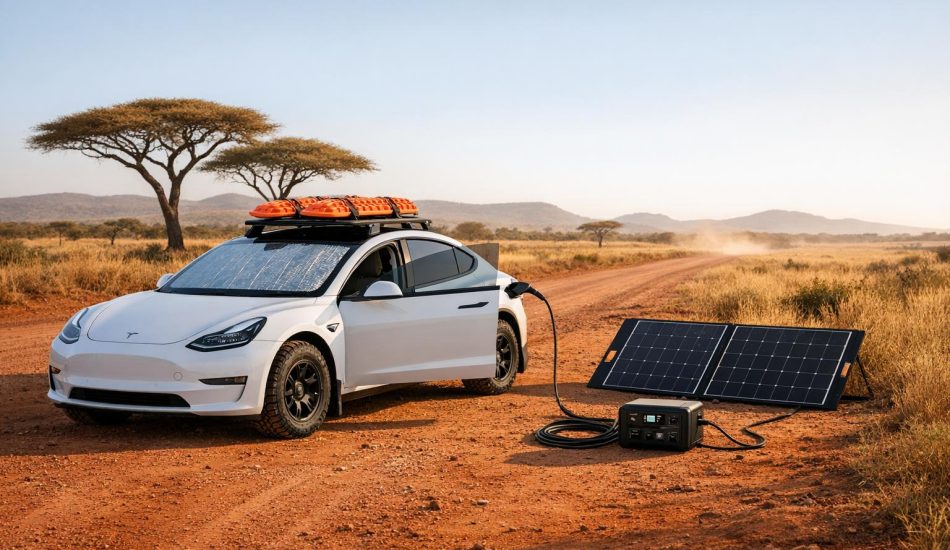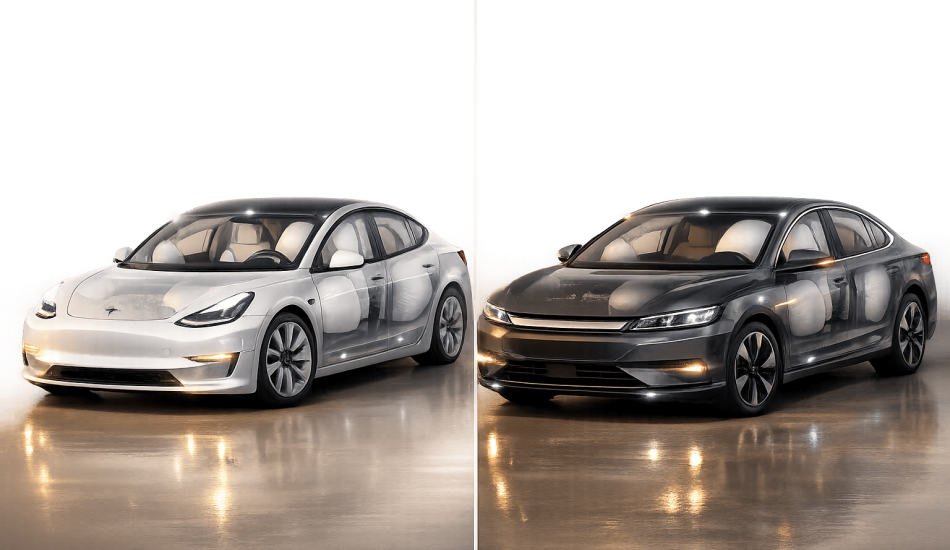
Electric vehicles (EVs) are becoming more common in Nigeria, particularly in cities like Lagos and Abuja. With an expanding charging network and financing options, owning an EV is now more practical. Key points:
- Popular Models: Tesla Model 3 & Y, BYD ATTO 3, Hyundai Kona Electric, Geely Geometry A, and Leapmotor T03.
- Prices: Costs vary due to import duties, exchange rates, and local assembly. Financing options start at 9% APR.
- Buying Options: Purchase from local dealerships, import directly, or use online platforms like EV24.africa.
- Charging Solutions: Home charging is common; solar setups are gaining interest.
- Maintenance: Focus on battery health and routine care.
- Registration & Insurance: EV-specific policies cover batteries and charging equipment.
Nigeria’s EV market is growing, offering more choices and better infrastructure for buyers.
Electric Car Models Available in Nigeria 2025
The electric vehicle (EV) market in Nigeria is growing, offering a mix of premium sedans, versatile SUVs, and compact city cars. These options cater to both urban and intercity travel, making EVs more accessible to a wider audience. Let’s take a closer look at some of the leading models and their standout features.
Top Electric Vehicle Brands and Models
Tesla leads the premium EV category with its Model 3 and Model Y. Both models are known for cutting-edge technology and strong performance capabilities. BYD has gained traction with the ATTO 3, a mid-size SUV designed to handle local road conditions while offering competitive pricing. For urban professionals, Hyundai’s Kona Electric is a favorite, thanks to its compact size, energy efficiency, and quick charging capabilities. Meanwhile, Geely’s Geometry A combines sleek design with reliable performance, and Leapmotor’s T03 is perfect for city driving, boasting a small footprint and nimble handling.
Feature Comparison
Each model brings unique strengths to the table, influencing both price and ownership preferences. Some vehicles focus on long-range capabilities and fast charging, making them ideal for frequent travelers, while others prioritize affordability and ease of handling for city use. Key factors to consider include:
- Driving range: How far the car can travel on a single charge.
- Charging compatibility: Whether the car supports local charging infrastructure.
- Interior comfort: The level of luxury and convenience offered inside the cabin.
- Cargo space: Storage capacity for daily or travel needs.
These EVs are available through various channels, including direct imports, authorized dealerships, and local assembly. This variety ensures options for different budgets and practical requirements, making it easier for Nigerians to embrace electric mobility.
Electric Car Prices in Nigeria 2025
The price of electric vehicles (EVs) in Nigeria spans a broad range, shaped by the model, features, and additional costs like import duties, shipping fees, and local markups. Several key factors influence how much Nigerian consumers end up paying.
What Affects EV Prices in Nigeria
A variety of external factors contribute to the pricing of electric vehicles in the Nigerian market:
- Import Duties and Tariffs: These significantly raise the base cost of EVs.
- Exchange Rate Fluctuations: The shifting value of the Nigerian naira against the US dollar often leads to unpredictable price changes.
- Shipping and Logistics: Costs such as port handling and clearing fees add to the overall expense.
- Local Assembly: Vehicles assembled domestically using imported parts tend to be more affordable since they bypass some import duties.
- Dealer Markups: Dealerships may add premiums, often linked to extra services like extended warranties or after-sales support.
By understanding these factors, potential buyers can plan their budgets more effectively and make better-informed choices when exploring the EV market. The high costs associated with these vehicles also make financing options a critical consideration for many.
Financing and Payment Options
To make EVs more accessible, financing options are available to help offset their high upfront costs. Loans typically start at 9% APR, with repayment terms ranging from 12 to 60 months. For instance, a ₦2,500,000 loan spread over 36 months at a 12% interest rate would result in monthly payments of ₦83,033, with total interest amounting to ₦489,188.
Streamlined digital pre-approval processes now allow buyers to secure financing within 24 hours. For those seeking ethical financing options, Jaiz Bank Plc introduced Shariah-compliant EV financing in August 2025, catering to buyers who prefer interest-free solutions.
Corporate and fleet financing options are also gaining traction, offering businesses flexible ways to transition to electric fleets. Payment structures such as partial payments during the ordering phase or lease-to-own arrangements provide additional flexibility for managing costs.
Industry experts predict a sharp rise in the adoption of EV financing over the next year or two, driven by increased consumer awareness and the continuous improvement of financial products.
How to Buy: Dealerships, Import Options, and Delivery
Buying an electric vehicle (EV) in Nigeria comes down to deciding between three main options: purchasing from local dealerships, importing directly, or opting for delivery services. Each method has its own advantages and can help navigate the challenges of pricing, financing, and availability discussed earlier.
Trusted Dealerships and Platforms
Nigeria’s EV market has a growing network of authorized dealerships, import experts, and online platforms tailored to meet various buyer needs. Companies like Stallion Group and Mikano International stand out by offering warranties, financing plans, and reliable after-sales support. It’s wise to work with dealers who specialize in EVs rather than those who only occasionally stock them. Dedicated EV dealers can provide essential services like dependable maintenance, genuine spare parts, and warranties for the battery – arguably the most crucial component of any electric vehicle.
For those who prefer the convenience of online shopping, platforms such as EV24.africa offer a wide range of EVs from brands like Tesla, BYD, Leapmotor, ROX, Dongfeng, Geely, Hyundai, Toyota, and Suzuki. These platforms often include detailed specifications, transparent pricing, financing options, and delivery services, making the entire process more seamless. Checking customer reviews can also give you insight into the quality of their service.
If local dealerships don’t have the model or features you’re looking for, importing might be a better alternative, though it does come with added steps and expenses.
Import Process and Costs
Importing an EV opens up access to a broader range of models but involves additional costs, such as import duties and shipping fees. Exchange rate fluctuations can also affect the final price. Proper documentation is critical to ensure a smooth import process. Once the vehicle arrives, arranging efficient delivery to your location becomes the next priority.
Delivery and Shipping Options
Whether you’re buying locally or importing, delivery logistics play a key role. Some sellers provide door-to-door delivery services, handling everything from shipping to customs clearance. Others may require you to manage transport and clearance yourself. It’s important to review shipping terms carefully and consider transit insurance to protect your investment.
sbb-itb-99e19e3
Tips for EV Ownership in Nigeria
Owning an electric vehicle (EV) in Nigeria comes with its own set of opportunities and challenges. With the country’s EV ecosystem still developing, navigating charging, maintenance, and legal requirements requires a bit of preparation. Here are some practical tips to help you make the most of your EV ownership experience.
Charging Infrastructure and Solutions
Given the limited public charging network in Nigeria, most EV owners rely heavily on home charging. Installing a Level 2 charger, ideally through a trusted local provider, is a great starting point. With a standard 240V outlet, many EVs can fully charge overnight, ensuring your car is ready to go each day.
In cities like Lagos and Abuja, commercial areas and shopping centers are starting to offer public charging stations. However, since the network is still expanding, it’s smart to plan your routes carefully, especially for long trips, and identify charging points in advance. Keeping a portable charging cable in your car can also be a lifesaver in unexpected situations.
Another option gaining traction is solar charging. Thanks to Nigeria’s abundant sunlight, a solar setup with battery storage can provide energy independence. While the initial cost is higher, it can lead to significant savings on electricity over time and reduce reliance on the sometimes-unreliable power grid.
Maintenance and After-Sales Services
While EVs generally require less maintenance than traditional vehicles, they still need proper care to ensure long-term performance. One of the most critical aspects is battery health, as replacing a battery can be expensive. Fortunately, many EVs come with extended battery warranties, so it’s important to understand the specifics of your coverage.
Routine maintenance tasks like software updates, tire rotations, and brake fluid checks are essential for keeping your EV in top shape. Regularly monitoring the battery’s condition can help you avoid costly replacements down the line. Platforms like EV24.africa offer valuable after-sales services, including warranty support, access to certified technicians, and genuine parts sourcing. Keeping detailed maintenance records and using certified service providers can save you time and prevent unnecessary delays.
Registration and Insurance Requirements
Once you’ve purchased your EV, it’s crucial to handle registration and insurance properly. Registering an EV in Nigeria follows the same process as traditional vehicles, overseen by the Federal Road Safety Corps (FRSC). You’ll need to provide proof of purchase, valid identification, and any state-specific paperwork. Registration fees are comparable to those for conventional cars and may vary depending on your location.
When it comes to insurance, EV owners should pay extra attention to coverage details. Standard auto insurance policies might not fully cover specialized EV components like the battery or charging equipment. Many insurers now offer EV-specific plans that include protection for these critical parts, though they can come at a higher cost. To ensure you’re fully covered, choose a policy that includes coverage for charging equipment damage or theft. It’s also wise to keep detailed records of your vehicle’s specifications, receipts for charging equipment, and documentation for any modifications, as these may be required during the claims process.
Conclusion
Purchasing an electric vehicle (EV) in Nigeria by 2025 represents a forward-thinking move toward cleaner, more efficient transportation. Making an informed choice – whether it’s about the right model, pricing, or delivery options – can ensure you get the best value for your investment. This guide has broken down the essentials to help simplify that decision-making process.
The Nigerian EV market is evolving, offering options for a variety of budgets. Financing solutions are also making it easier for more people to consider making the switch. Whether you opt to buy from local dealerships or import directly, platforms like EV24.africa provide a reliable way to explore transparent pricing, detailed specifications, and secure delivery options.
To enjoy a smooth EV ownership experience, planning ahead is key. Setting up a home charging station, arranging for maintenance, and taking care of registration and insurance are crucial steps. With Nigeria’s infrastructure steadily improving and a growing network of certified EV service providers, the practicality of owning an electric vehicle is becoming more realistic for everyday drivers.
It’s also important to think beyond the initial price tag. Consider factors like the cost of installing a charging setup, ongoing maintenance, and insurance. With Nigeria’s abundant solar energy and the expansion of charging networks, EVs offer both environmental advantages and potential savings compared to traditional gasoline-powered cars.
As the shift toward electric mobility gains momentum in Nigeria, early adopters stand to benefit the most. By making informed choices now, you’ll be well-positioned to take advantage of improved infrastructure, better service networks, and higher resale values as the market matures. Take the time to research, compare your options, and rely on trusted platforms to ensure a successful and rewarding EV ownership journey.
FAQs
What factors affect the cost of electric vehicles in Nigeria, and how can I budget for one?
The cost of electric vehicles (EVs) in Nigeria is shaped by a mix of factors like import duties, exchange rates, and dealership fees. On the bright side, government incentives – such as tax breaks or reduced import tariffs – can ease some of the financial burden. Plus, with fuel prices climbing, EVs are becoming a more appealing choice, even though their initial price tag may be higher.
When planning your budget, it’s smart to account for all associated costs. This includes import fees, setting up charging infrastructure, and ongoing maintenance. Keep an eye on government policies and incentives, as they can significantly lower your expenses. Staying informed will help you approach your EV purchase with confidence and clarity.
What is the current state of EV charging infrastructure in Nigeria, and how can I set up a home charging station?
Nigeria is making strides in developing its electric vehicle (EV) charging network, with plans to roll out 300 public charging stations in major hubs like Lagos and Abuja by mid-2025. To address the region’s specific energy challenges, solar-powered chargers and microgrid systems are also being introduced, offering alternative solutions.
For those charging at home, many EV owners opt for Level 1 or Level 2 chargers. The cost for these setups typically ranges from $750 to $3,500, depending on the equipment and installation needs. To ensure a safe and reliable installation, it’s wise to consult a certified electrician, evaluate your home’s energy capacity, and consider solar power as a sustainable option.
What should electric car owners in Nigeria know about insurance, and how is EV insurance different from regular auto coverage?
Electric car owners in Nigeria should explore insurance options tailored specifically for EVs. These policies often include coverage for essential components like batteries and charging equipment – areas that standard auto insurance usually overlooks. Given the higher costs tied to repairing or replacing these parts, EV-specific policies can be a smart choice.
Moreover, these specialized plans may also cover unique risks, such as damage to charging stations or battery malfunctions. By addressing the specific challenges of owning an electric vehicle, this type of insurance offers more comprehensive protection for your investment.




